Less Than Half of the Israeli Public Trust Prime Minister Netanyahu (Jews: 46% / Arabs: 10% / Overall: 40%)*
Prime Minister Netanyahu received a trust rating of 46% among Jewish Israelis and 10% among Arab Israelis (total sample: 40%). The official with the highest trust rating among Jewish Israelis (and therefore the total sample) was IDF Chief of Staff Eyal Zamir, at 68.5%. There were low levels of trust among Arab Israelis across all officials, though Mossad Director David Barnea received the highest rating, at 36%.

From left to right: Netanyahu – Photo by Chaim Goldberg, Zamir – Photo by Yonatan Sindel, Barnea – Photo by Chaim Goldberg | FLASH90
*Arab Israeli adults make up 17% of Israel's population.
Methodology
The survey was conducted by the Viterbi Family Center for Public Opinion and Policy Research at the Israel Democracy Institute between June 22–23, 2025. It was based on a representative sample of the population in Israel aged 18 and above, comprising 599 Jewish interviewees and 146 Arab interviewees.
The fire and rescue services enjoy the highest level of trust among the Israeli public as a whole, as well as in both the Jewish and Arab publics separately (92%, 97%, and 65%, respectively).
Just below them in the trust rankings is the IDF Home Front Command (total sample, 89%; Jews, 94%; Arabs, 64%).
Trust in the IDF overall is very high among Jews but low among Arabs (Jews, 93%; Arabs, 41%).
The police have the lowest levels of trust—among the Israeli public as a whole, as well as among both Jews and Arabs separately.
For all the institutions we asked about, trust ratings are lower among Arabs than among Jews, with the largest difference found regarding trust in the IDF. The smallest discrepancy is for trust in the respondent’s own local authority (Jews, 69%; Arabs, 47.5%).
Trust the following defense and rescue agencies very much or quite a lot (%)
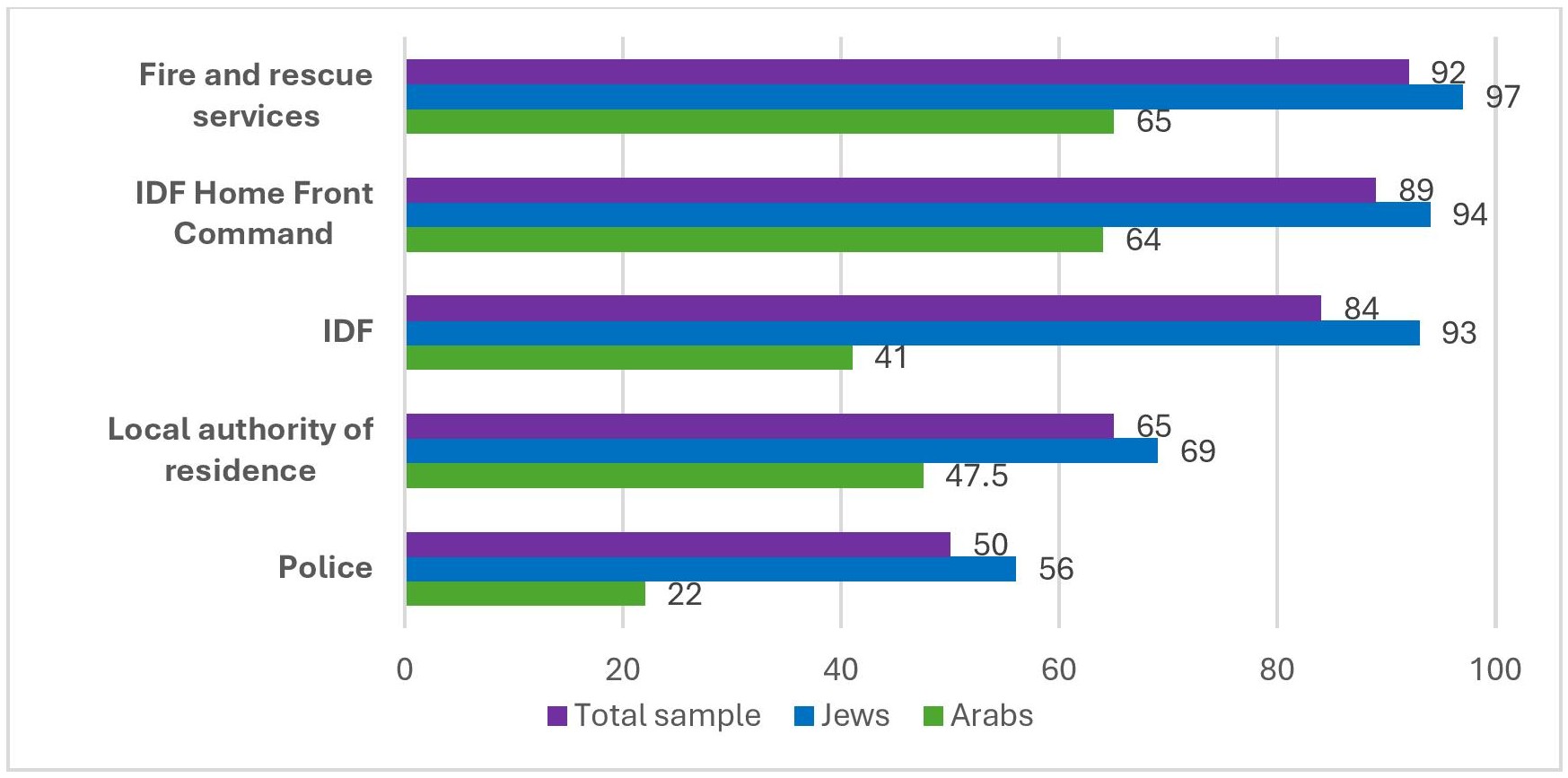
Breaking down the levels of public trust in these agencies by political orientation (Jewish sample) reveals only small differences—with the exception of trust in the police, which is very low on the Left, moderate in the Center, and high on the Right (30%, 47%, and 63%, respectively).
It is also worth noting that the trust levels on the Left are the lowest of the three camps for almost all these agencies, but are the highest when it comes to local authorities.
Trust the following defense and rescue agencies very much or quite a lot, by political orientation (Jews; %)
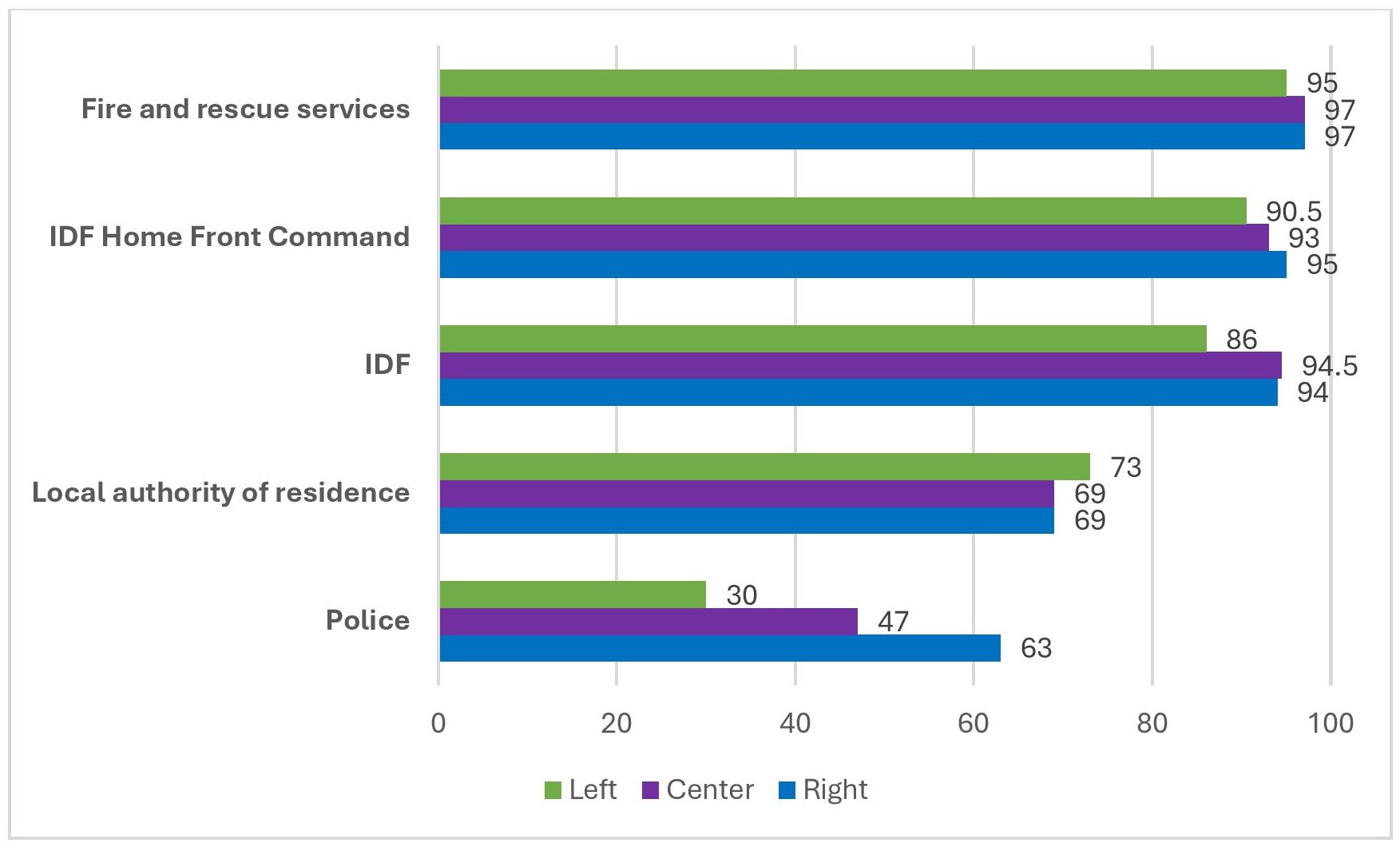
No gender differences were found for trust in defense and rescue agencies.
Breaking down responses by age, we found that the youngest age group (18–34) has slightly less trust in these agencies than do the oldest age groups, but these differences do not exceed 10 percentage points.
Among the political figures we asked about, Prime Minister Netanyahu received the highest trust rating among Jewish respondents, although this rating is still below 50%. Among Arab respondents, on the other hand, Netanyahu received the lowest trust rating, of just 10%.
Defense Minister Katz, who is second in the rankings of political figures, is trusted by just over one-third of Jews, but only 15% of Arabs.
In the total sample, the trust ratings for Transportation Minister Regev and Education Minister Kisch are very low (20% and 25%, respectively), and the differences in their trust ratings between Jews and Arabs are small.
The levels of trust in IDF Chief of Staff Zamir and Mossad Director Barnea are very high compared to politicians, but unsurprisingly, the difference in trust between Jews and Arabs regarding these figures are large: 77% of Jews express trust in Zamir, compared to 25% of Arabs, and 74% of Jews trust Mossad Director Barnea, compared to 36% of Arabs.
Trust the following public figures very much or quite a lot (%)
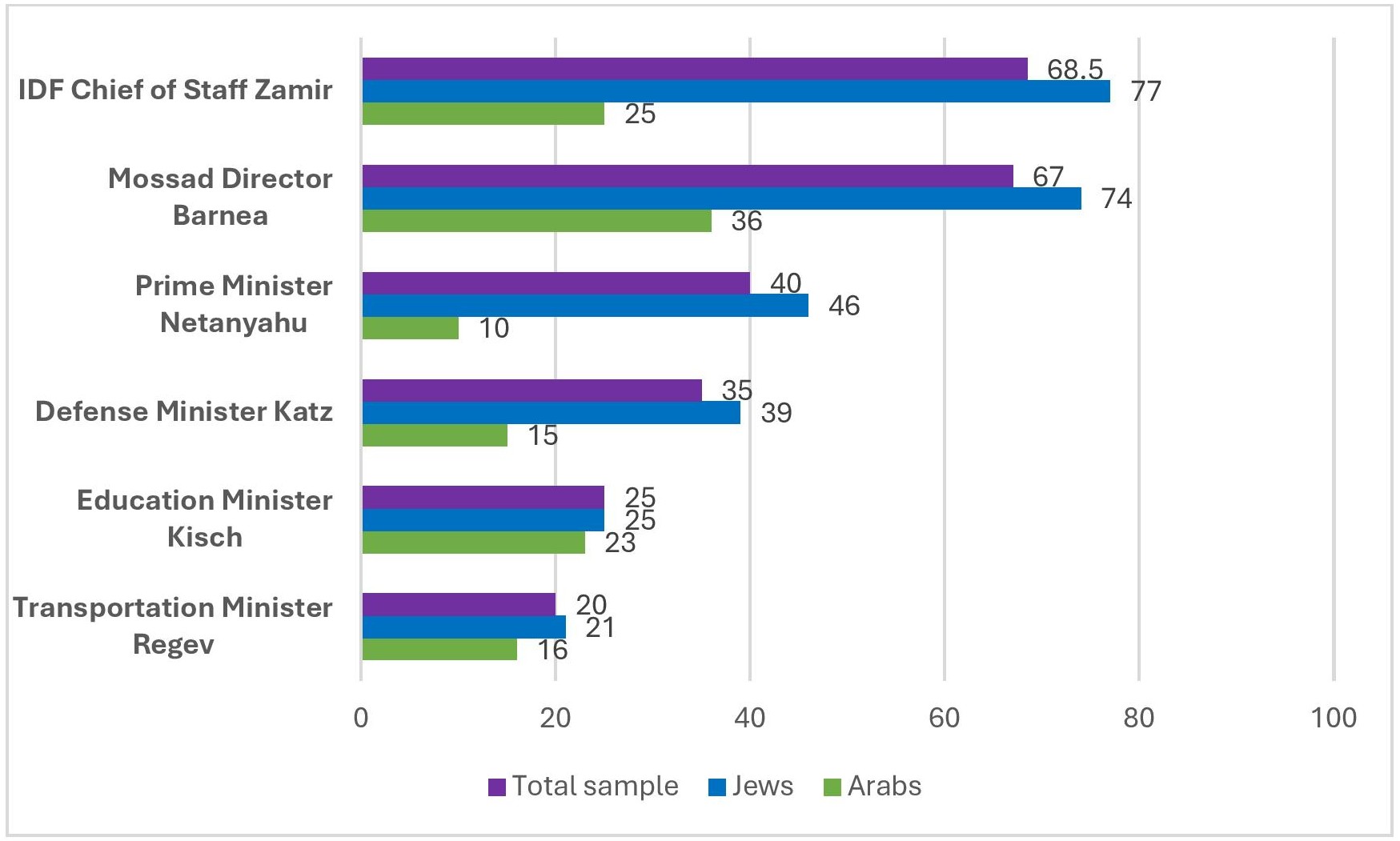
Breaking down responses in the Jewish sample by political orientation reveals significant differences in the trust ratings for political figures, and on the other hand, similarities in the level of trust in defense figures. On the Right, almost two-thirds trust Netanyahu and just over half trust Katz, though when it comes to Ministers Regev and Kisch, trust in them is low even in their own camp, at only about a third. In the Center, around a fifth say they trust Netanyahu and Katz, while only a small minority trust Kisch and Regev (12% and 10%, respectively). On the Left, the trust ratings for all these political figures are very low.
The shares of respondents who express trust in IDF Chief of Staff Zamir and Mossad Director Barnea are similarly large in all three camps.
Trust the following public figures very much or quite a lot, by political orientation (Jews; %)
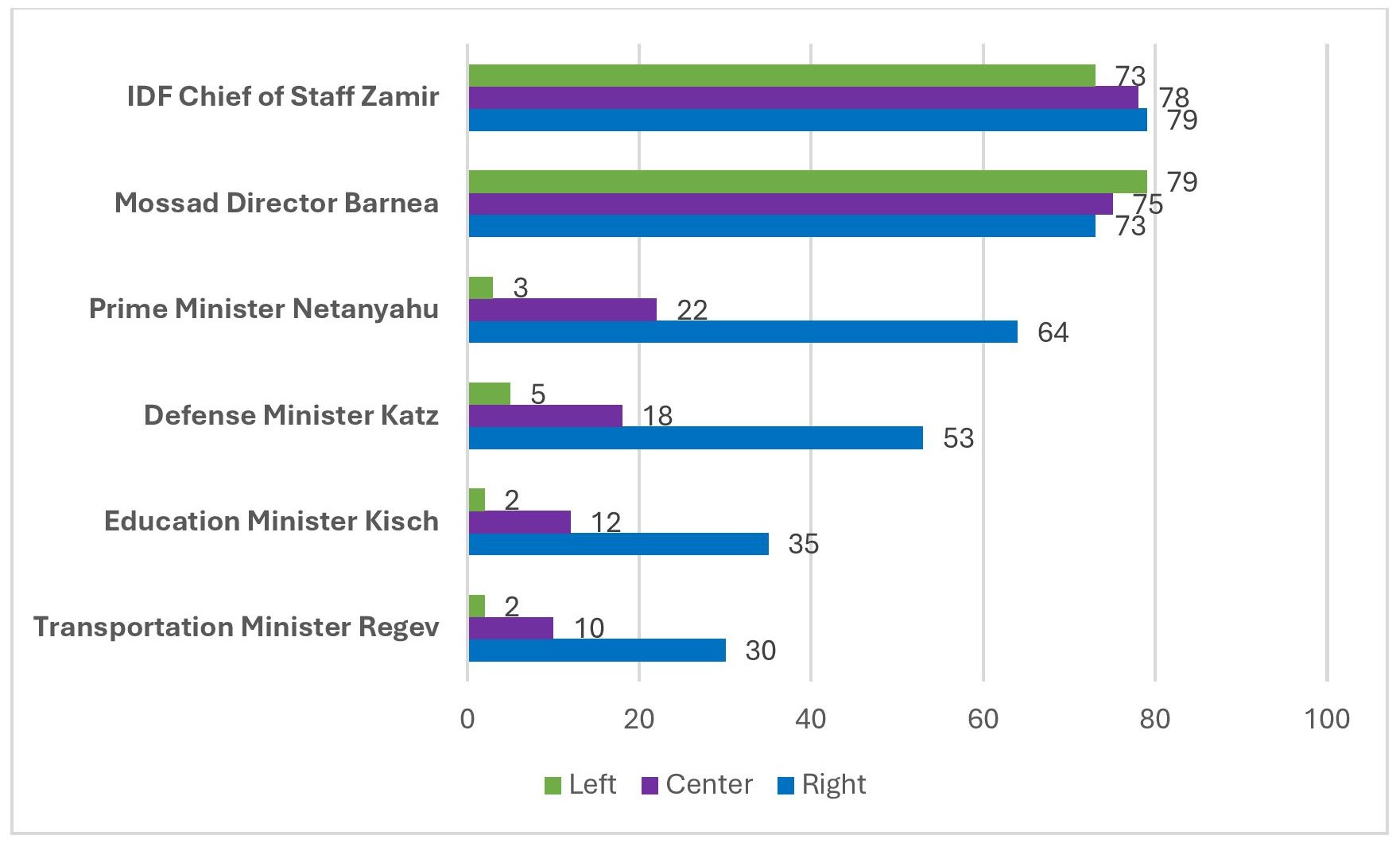
Breaking down the levels of trust in Prime Minister Netanyahu and IDF Chief of Staff Zamir by voting in the 2022 elections, we found that, as expected, the trust ratings for Netanyahu are very high among voters for the coalition parties, but very low among opposition party voters. It should be noted that among Likud voters, the share who trust Netanyahu is smaller than the equivalent share of voters for the other coalition parties, and also slightly smaller than the share of Likud voters who express trust in IDF Chief of Staff Zamir.
Zamir enjoys fairly high trust ratings among both coalition party voters and those who voted for the Zionist opposition parties: Particularly high ratings were given by voters for National Unity and Yesh Atid (86% and 84.5%, respectively), while Zamir’s lowest trust rating (though still representing a majority of respondents) was recorded among voters for United Torah Judaism (65%). Among voters for Arab parties, the share who trust the chief of staff is much smaller.
Trust Prime Minister Netanyahu and IDF Chief of Staff Zamir very much or quite a lot, by vote in the 2022 elections (total sample; %)
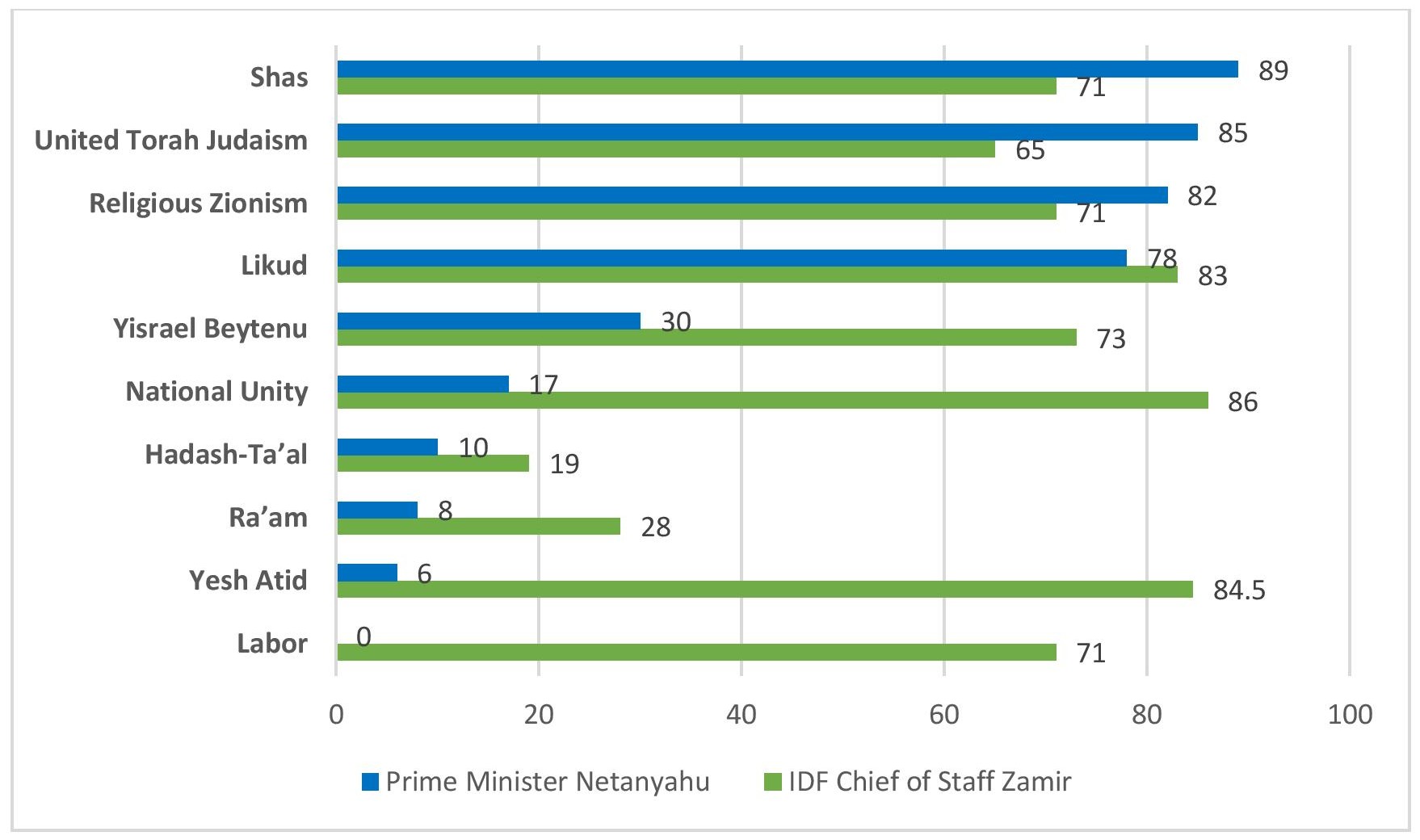
A breakdown of responses by gender reveals that among both Jews and Arabs, the level of trust in IDF Chief of Staff Zamir is higher among men than among women: Among Jews, 84% of men say they trust the chief of staff, compared to 71% of women, while among Arabs, 29.5% of men trust Zamir, compared to 20.5% of women.
Public trust in the various media outlets is much lower than in the agencies we examined above.
Here, too, trust among Arabs is lower than among Jews.
The channels operated by the Israel Public Broadcasting Corporation (Kan) have the highest trust ratings in the total sample, as well as among Jews and Arabs separately.
Channel 14 has the lowest trust ratings, although as shown below, it is the most controversial in the Jewish public, and trust in it depends on political views.
Trust the following media outlets very much or quite a lot (%)
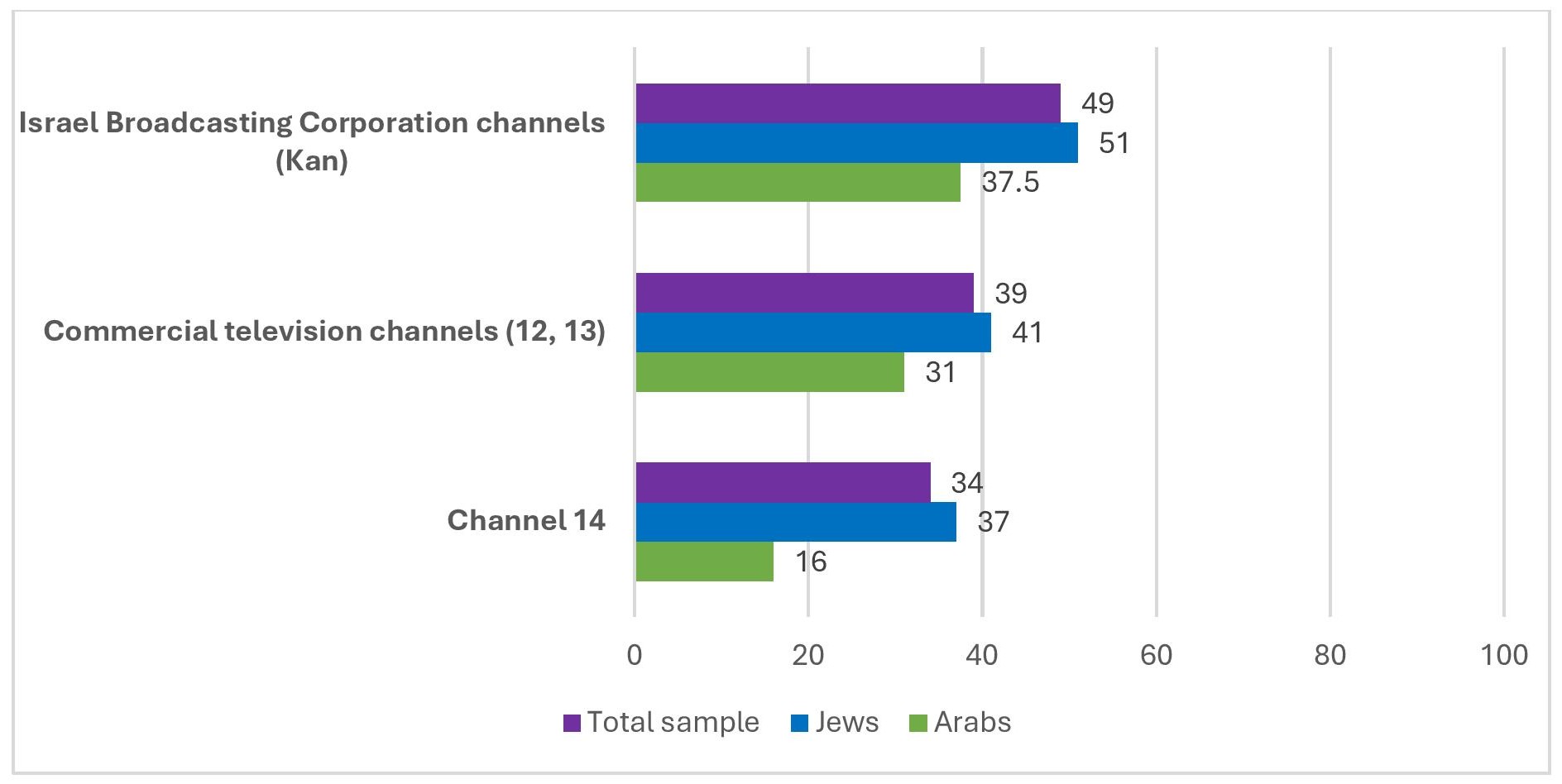
In contrast to the previous breakdown of responses in the Jewish sample by political orientation—regarding defense and rescue agencies, where we found small differences in trust in most agencies—when it comes to media outlets, the discrepancies are enormous. In fact, it would seem that each political camp receives its information from different media sources, with the largest gap (unsurprisingly) being between those on the Left and those on the Right.
An interesting finding is that on average, those who define themselves as on the Left have more trust in the media than those who identify as on the Right, with those in the Center somewhere in between.
Trust the following media outlets very much or quite a lot, by political orientation (Jews; %)
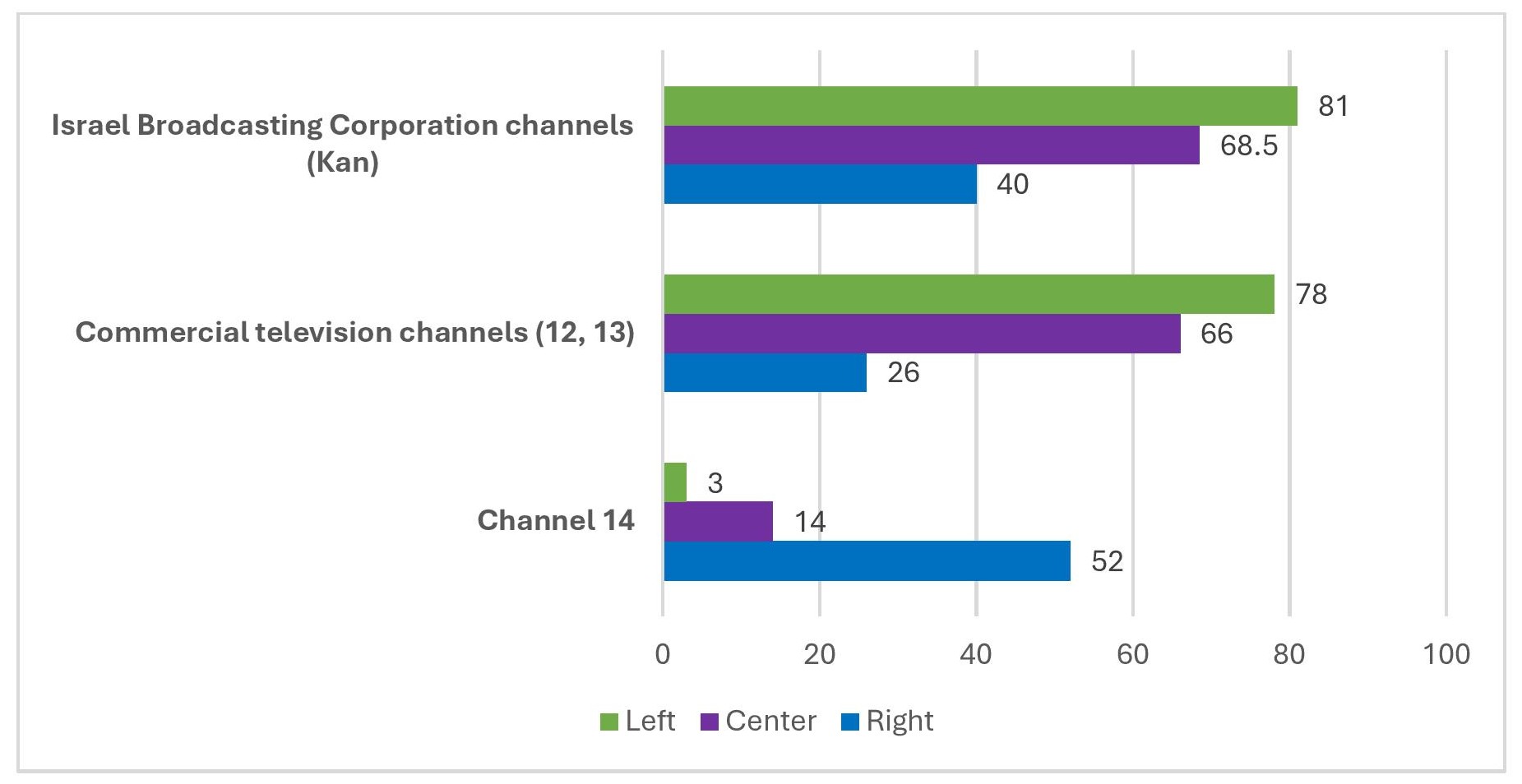
Breaking down responses by gender, we did not find significant differences between men and women, with the exception of Channel 14, where has greater levels of trust among Jewish men than Jewish women (41% and 33%, respectively).
A breakdown by age revealed that the trust ratings for the various media outlets are higher in the oldest group than in the two younger age groups.
This survey was prepared by the Viterbi Family Center for Public Opinion and Policy Research at the Israel Democracy Institute. The survey was conducted via the internet between June 22–23, 2025, with 599 men and women interviewed in Hebrew and 146 in Arabic, constituting a nationally representative sample of the adult population in Israel aged 18 and over. The maximum sampling error was ±3.59% at a confidence level of 95%. Field work was carried out by iPanel. The full data file can be found at: https://dataisrael.idi.org.il.
